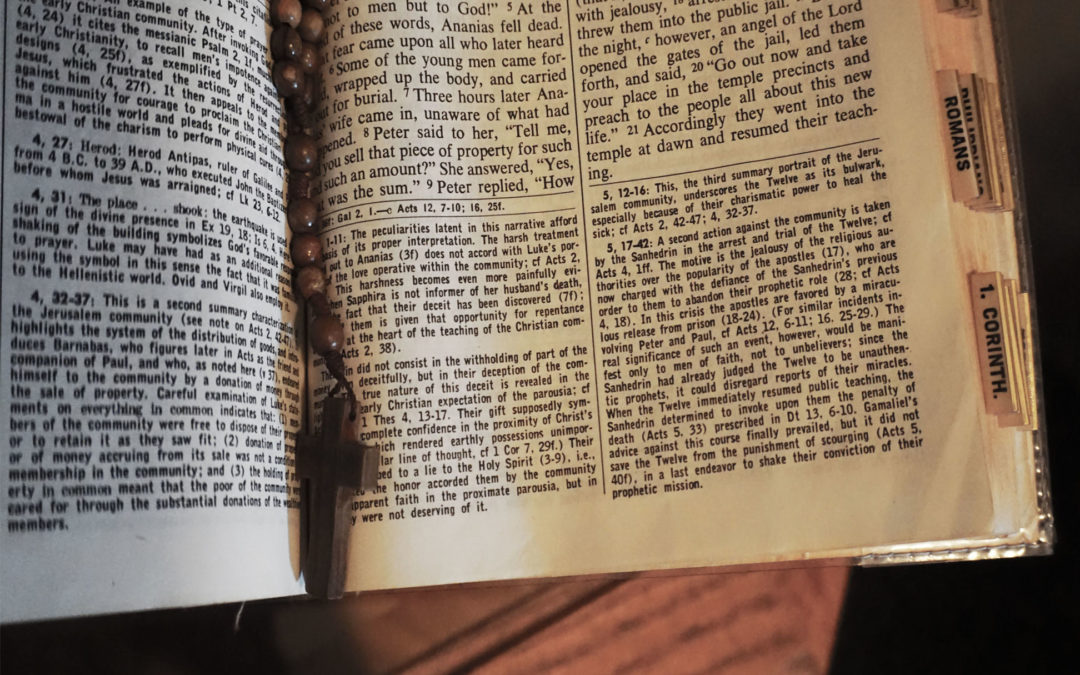When you’re in the midst of turmoil, it’s easy to think that times have never been so bad. But God’s people have lived through plenty of times of trouble throughout the ages, and they’ve left a road map in Scripture that can help lead us back to the light.
Fr. Al Spilly, C.PP.S., a Scripture scholar who now lives at St. Charles Center in Carthagena, Ohio, said that one of the greatest crises in the Old Testament is the destruction of the temple by the Babylonians, thought to have happened in 586 BC. “There were signs from the prophets that it was coming, but nobody thought it would happen because Jerusalem was God’s city. Surely God wouldn’t let it happen,” Fr. Spilly said.
The Jewish people were scattered, exiled. Scared and isolated, they had to reexamine their relationship with God and with each other. “What had happened to the promise (that God would protect them)? Who were they without God?” Fr. Spilly said. “They feared they would lose their identity as a people.”
It was a time of questioning, of introspection and ultimately of re-creation and recommitment to the God who was their creator and guide.
“And that’s where we are again,” Fr. Spilly said. “To the prophets, the exile was a punishment for sin. That’s too easy of an answer. And Pope Francis has been very careful NOT to talk about the coronavirus as a punishment for something. But it is a time when we need to take a good look at ourselves.”
The people of Israel had to go through three stages to rediscover their identity and their relationship with God, Fr. Spilly said. The first was to realize that God had not abandoned them. (This is a theme that we heard on the Sixth Sunday of Easter, when Jesus reassures his disciples at the Last Supper, “I will not leave you orphans.”)
The second task was to go back to their traditions, “what defines them as a people,” Fr. Spilly said. They had to return and recommit to their covenant with God, “and then, thirdly, “they had to act on it.” They had to restore right relationships.
“When you have right relationships, the result is peace-shalom, wellbeing, health, harmony,” Fr. Spilly said. God calls us to right relationships with God, with the land, with others, and within ourselves.
Here we are again in a crisis, a crossroads. “The word ‘crisis’ is interesting,” Fr. Spilly said. “The Greek word krisis means a decision, a turning point. You come to a fork in the road and you have to decide which way to go. And that’s where we are right now. It’s not just about when and how to reopen; there are larger issues. We have 30-40 million people out of work; the death toll is still rising.
“But the basic decision for each of us is, how are we going to live our life? It’s up to us. Even in these troubled times, we see stories about how people are coming together, neighbors helping neighbors. We’re all children of the one God. We need to learn how to treat one another well. It’s time for new beginnings, a new creation.”
Solace in Scripture
The path forward is not a path that we have to find on our own. “When things look totally out of control, when it’s a time of crisis, hang on,” Fr. Spilly said. “Everything is ultimately in God’s hands: trust him.”
He suggested the following Scripture passages that can help in times of trial:
Isaiah 43: This is one I use when I’m preaching on something difficult. I also use it myself when I’m facing a medical test or surgery, or even just to help get through a bad day.
Ezekiel 37: The Lord can bring even dry bones back to life. The Lord says, “I will put my spirit in you that you may come to life.”
John 14: Jesus is preparing a place for us in his Father’s house.

